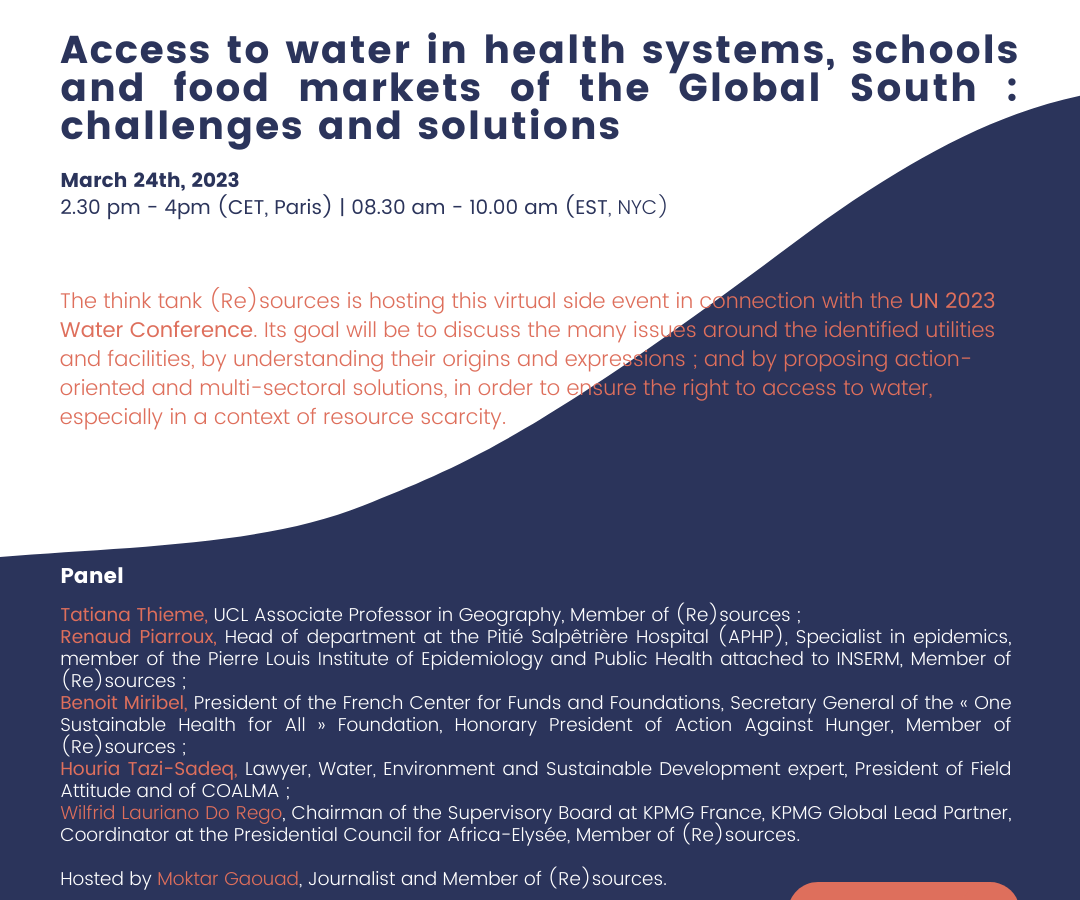UN 2023 Water Conference Side Event

Access to water in health systems, schools and food markets of the Global South : challenges and solutions
March 24th, 9.30am – 11.am (ECT), Zoom
Organized by the Think tank (Re)sources
Background on the event
Utilities and facilities are closely tied. The examples of food markets, health centers and school’s access to water in the Global South illustrate how poor water quality and lack of sanitation raise broader issues around waterborne diseases and malnutrition, medical care, food sovereignty, economic development, and security among many others. The goal of this side event was to discuss these many issues, by understanding their origins and manifestations ; and by proposing action-oriented and multi-sectoral solutions, in order to ensure the right to access to water (UN Resolution 64/292 (2010)), especially in a context of
resource scarcity.
Water Action Agenda
As think tank (Re)sources, our main strength resides in our capacity to create and sustain places of free debate, which often lead to high-level forums for collective emulation and action. As part of the Water Action Agenda, we are organizing a one-day Conference with our partners One Sustainable Health Forum and the CDG Group Institute (Morocco). Alongside these national, Global South and international actors, (Re)sources aims, through this day-long conference, to bring together several high-level personalities to build a shared vision for a better access to essential services in the Global South.
Key Issues discussed
- The concept and practise of the one health approach
- The impact of the lack of access to water for education and economy
- The health consequences of lack of access to water and sanitation services
- The collaboration, transmission and circulation of knowledge and expertise between the different poles (within the Global South, from the Global South to the North and from the North to the Global South)
- The question of standards and finding the balance between technological innovation and a good enough innovation, in a context of emergency and/or development
- The psychological brakes that hinder the implementation of services or new practices
- The necessity to mainstream water issues
- The creation and implementation of mechanisms of coordination and synergy for a better water management
- The importance of environmental justice issues to combat local struggles
Key recommendations for action
- To integrate One health concept to the global health concept
- The importance of local, specific and field approaches : to understand coping mechanisms, experiences and cultural differences
- Action plan, policy and investing in research as long-term solutions
- On the right to water: to prevent, protect and improve public policies to make the right effective
- The necessity to bring the Global South’s experiences in the smart management of scarcity and its cultural approach to water management to the global water debate.
- To create behavioural changes through narratives
- To promote a global governance of water, inclusive of the various stakeholders
- To monitor and follow-up water issues and initiatives

